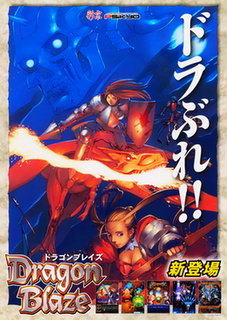
A video game or computer game is an electronic game that involves interaction with a user interface or input device – such as a joystick, controller, keyboard, or motion sensing device – to generate visual feedback. This feedback is shown on a video display device, such as a TV set, monitor, touchscreen, or virtual reality headset. Video games are often augmented with audio feedback delivered through speakers or headphones, and sometimes with other types of feedback, including haptic technology. Computer games are not all video games—for example text adventure games, computer chess, and so on do not always depend upon a graphics display.

The Sega Saturn is a home video game console developed by Sega and released on November 22, 1994, in Japan, May 11, 1995, in North America, and July 8, 1995, in Europe. Part of the fifth generation of video game consoles, it was the successor to the successful Sega Genesis. The Saturn has a dual-CPU architecture and eight processors. Its games are in CD-ROM format, and its game library contains several ports of arcade games as well as original games.

SNK Corporation is a Japanese video game hardware and software company. It is the successor to the company Shin Nihon Kikaku and presently owns the SNK video game brand and the Neo Geo video game platform. SNK's predecessor Shin Nihon Kikaku was founded in 1978 by Eikichi Kawasaki. The corporation was initially named Shin Nihon Kikaku. In 1981, the name was informally shortened to SNK Corporation, which became the company's official name in 1986.

Namco Limited was a Japanese multinational video game and entertainment company, headquartered in Ōta, Tokyo. It held several international branches, including Namco America in Santa Clara, California, Namco Europe in London, Namco Taiwan in Kaohsiung, and Shanghai Namco in mainland China.

Dig Dug is a maze arcade game developed by Namco in 1981 and released in 1982, distributed in North America by Atari, Inc. The player controls Dig Dug to defeat all enemies per stage, by either inflating them to bursting or crushing them underneath rocks.

In computer graphics, a sprite is a two-dimensional bitmap that is integrated into a larger scene, most often in a 2D video game. Originally, the term sprite referred to fixed-sized objects composited together, by hardware, with a background. Use of the term has since become more general.

GameSpy was an American provider of online multiplayer and matchmaking middleware for video games founded in 1996 by Mark Surfas. After the release of a multiplayer server browser for the game, QSpy, Surfas licensed the software under the GameSpy brand to other video game publishers through a newly established company, GameSpy Industries, which also incorporated his Planet Network of video game news and information websites, and GameSpy.com.

CAVE Interactive Co., Ltd. is a Japanese video game company founded in 1994 by former employees of Toaplan following its bankruptcy. They are known primarily for their "bullet hell" shoot 'em ups; from 1995 up to 2013, CAVE was one of the most prolific shoot 'em up developers in the Japanese market. Alongside this, CAVE has produced a variety of other types games for arcades, home consoles, PCs, and smartphones, also dating back to 1995.

The Fallen Angels is an unfinished, 1998, 2D versus fighting arcade game developed by the Steel Hearts development team and published by Psikyo. It was Psikyo's second attempt in the 2D versus fighting genre after Battle K-Road.
Kaneko Seisakusho (金子製作所), stylized as KANE<O, also referred to as Kaneko Co. Ltd. (カネコ株式会社), was a Japanese video game publisher founded in Suginami, Tokyo, Japan by Hiroshi Kaneko. It published a number of games both under its brand and other companies, such as Air Buster, Nexzr, Shogun Warriors, DJ Boy, Guts'n, and the Gals Panic series.

Dragon Blaze is a shoot 'em up arcade game developed and published in 2000 by Psikyo. It was ported to the PlayStation 2 as part of Taito's Psikyo Shooting Collection Vol. 3: Sol Divide & Dragon Blaze compilation in 2005. The game was later also released on its own as a budget range title for the PlayStation 2 in Europe by 505 Games on 2006. In 2018 the game was ported to the Nintendo Switch by ZeroDiv as part of their series of re-releases of classic Psikyo games.

Sengoku Ace, fully titled Sengoku Ace: Tengai Episode I and also known as Samurai Aces in the English version, is a vertically scrolling shooter released in the arcades by Psikyo in 1993. The first game by Psikyo, Sengoku Ace was designed by Shin Nakamura, the creator of Aero Fighters and the company's founder.
MT Framework is a game engine created by Capcom. "MT" stands for "Multi-Thread", "Meta Tools" and "Multi-Target". While initially MT Framework was intended to power 2006's Dead Rising and Lost Planet: Extreme Condition only, Capcom later decided for their internal development divisions to adopt it as their default engine. As a result, the vast majority of their internally developed video games for the PlayStation 3 and Xbox 360 platforms were created on it, including four new titles and three remastered ports of past titles in the Resident Evil series, Capcom's biggest franchise. The visuals of the first games built with the engine were well received, and MT Framework has also won a CEDEC award.

Sega Corporation is a Japanese multinational video game and entertainment company headquartered in Shinagawa, Tokyo. Its international branches, Sega of America and Sega Europe, are headquartered in Irvine, California, and London. Its division for the development of both arcade games and home video games, Sega Games, has existed in its current state since 2020; from 2015 to that point, the two had made up separate entities known as Sega Games and Sega Interactive Co., Ltd. Sega is a subsidiary of Sega Group Corporation, a part of Sega Sammy Holdings. From 1983 until 2001, Sega also developed video game consoles.
Nihon Maicom Kaihatsu, better known as NMK, was a Japanese video game developer that created various arcade games and shoot 'em ups. The company is best and mostly known for its Neo Geo title, Zed Blade.

The history of Sega, a Japanese multinational video game and entertainment company, has roots tracing back to Standard Games in 1940 and Service Games of Japan in the 1950s. The formation of the company known today as Sega is traced back to the founding of Nihon Goraku Bussan, which became known as Sega Enterprises, Ltd. following the acquisition of Rosen Enterprises in 1965. Originally an importer of coin-operated arcade games to Japan and manufacturer of slot machines and jukeboxes, Sega began developing its own arcade games in 1966 with Periscope, which became a surprise success and led to more arcade machine development. In 1969, Gulf and Western Industries bought Sega, which continued its arcade game business through the 1970s.

Sol Divide is a 1997 video game for the arcades developed by Japanese studio Psikyo. It was later ported to the PlayStation, Sega Saturn, and later PlayStation 2, Windows and Nintendo Switch.












